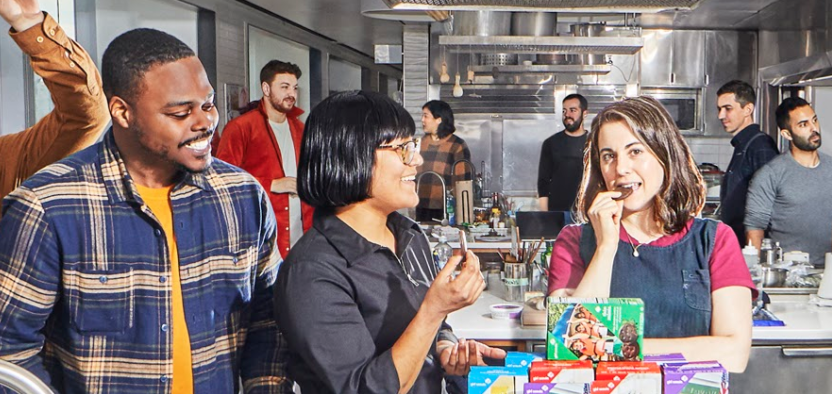Many find great solace in the seemingly authentic, unscripted banter of the Bon Appétit Youtube channel. Gourmet Makes— a series led by pastry chef Claire Saffitz— routinely gets more than a million views per video as viewers become entranced with the perfectly imperfect culinary recreations of popular American snacks.
The Bon Appétit test kitchen crew, a group of chefs that appear on the Youtube channel to give cooking tips and occasionally some comic relief, has amassed somewhat of a cult following, with meme pages poking fun at their likable onscreen personalities.
http://www.instagram.com/p/CA6FKE1jSuf/
That cult following, however, was thrust into a state of disorder as a series of photos, old tweets and employee confessions exposed an endemic culture of racism and complicity at the Condé Nast food publication. Shortly after a photo of then-editor-in-chief Adam Rapoport in brownface circulated on Twitter, Sohla El-Waylly, a Bengali assistant editor at the magazine who frequently appears on videos, condemned his actions and asked Rapoport to resign. She further elaborated on her experiences as a woman of color at Bon Appétit, voicing her anger at her disproportionately low salary despite having 15 years of experience. El-Waylly also noted that no chefs of color were offered financial compensation for their video appearances.
I do not know why Adam Rapoport simply doesn’t write about Puerto Rican food for @bonappetit himself!!! https://t.co/rW0k5tjMoS pic.twitter.com/odZnFLz2gd
— TAMMIE TECLEMARIAM (@tammieetc) June 8, 2020
In case you’ve missed it: Not only is Sohla one of the only front facing Bon Appetit editors to denounce EIC Adam Rapoport doing brown face, apparently only white BA editors are paid for their video appearances. Here’s her Instagram story just now pic.twitter.com/h0uPMlJYHN
— Sarah Manavis (@sarahmanavis) June 8, 2020
Fans responded with an outpouring of support for El-Waylly, many remarking her colossal bravery in speaking out against her boss at a large, prestigious publication.
the fact that sohla was hired at bon appetit for $50K/year and doesn’t get paid for video appearances like her white colleagues is digusting. anyways here’s a montage of her cooking circles around everyone at ba pic.twitter.com/uzZsRMGIwf
— sarah (@s_whip_) June 11, 2020
I was so disappointed to find out that this queen wasn’t being paid equally even after all of the times she tempered chocolate for Claire 😞 #BonAppetit https://t.co/cGOZLaD7pY
— lex (@cooolghoul) June 9, 2020
In a Buzzfeed News interview, El-Waylly commented on how she was manipulated to fix the publication’s ongoing diversity problem: “They were asking me to stand in the background of photo shoots and video shoots, which made me super uncomfortable.”
Bon Appétit’s racist incidents speak to a larger truth about the corporate commodification of diversity.
Nancy Leong, a law professor at the University of Denver, writes in Harvard Law Review that racial capitalism, “the process of deriving social and economic value from the racial identity of another person,” may result in “white individuals and predominantly white institutions to treat nonwhiteness as a prized commodity rather than a cherished and personal manifestation of identity.”
It is amazing to see that Priya Krishna, an Indian woman, El-Waylly, a Bengali woman, Christina Chaey, a Korean woman and Rick Martinez, a gay Latino man, all appear on the Youtube channel– but outside of the falsely colorful reality of the Youtube channel, they still experience covert racism through lower salaries, fewer promotions and less airtime.
The tokenization of their non-white racial identities is a bare minimum, and it creates a facade of diversity. From Chaey “popping in” as Chris Morocco cooks Korean ribs to El-Waylly being placed in the background of videos to add a splash of color, the exploitation of BIPOC employees to diversify the white-dominated test kitchen is immensely degrading. It reduces BIPOC experiences as something to be bought, marketed and sold.
https://www.instagram.com/p/CBTPYc7jLUv/
The corporate commodification of diversity is inherent in many industries. Milk Makeup, a makeup brand that frequently champions diversity in beauty standards as part of their marketing campaigns, drew controversy when a former employee spoke out about her racially charged experiences working there.
https://twitter.com/zoeyy227/status/1268986088410021892
Powerful corporations and institutions that shape their respective industries— whether it’s Milk Makeup or Bon Appétit— brag about inclusivity. But inclusivity is not enough. There needs to be meaningful reform in company culture and company initiatives that actively target hate.
Numerical diversity is only the first step towards equality. It’s just as important that we — as consumers of media — hold corporations accountable and ensure that we are not complicit in such issues.
Featured image via Bon Appétit on Youtube












